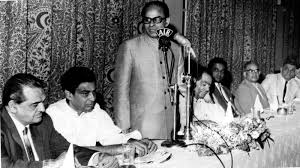When Indira asked I&B Minister Gujral to hold her raincoat: ‘You can’t do any other work’

Indian politics has always been a stage for powerful personalities and intense rivalries. One moment that stands out happened during a flood relief tour in the 1970s. Prime Minister Indira Gandhi reportedly handed her raincoat to her Information and Broadcasting Minister, I.K. Gujral. With a sharp remark, she told him, “You can’t do any other work, so just hold this.”
Though the gesture seemed small, it exposed deeper tensions within her cabinet. It also reflected Indira Gandhi’s tight grip on power during that period.
The Setting: A Flood Relief Visit
This incident took place during a visit to a flood-hit area, likely in Bihar or eastern Uttar Pradesh. Indira Gandhi was assessing the damage, and several ministers, including I.K. Gujral, accompanied her.
When it began to rain, she handed over her raincoat to Gujral. Her words sounded sarcastic and dismissive. It was more than just a practical move — it humiliated a senior minister in public.
A Sharp Message in a Simple Act
By the mid-1970s, Indira Gandhi had centralized power within the Congress party. She didn’t tolerate ministers who disagreed with her or failed to meet her expectations. Her treatment of Gujral during the visit reflected this approach.
Observers believe this raincoat moment symbolized her declining trust in Gujral. He was known for his calm and principled manner. Perhaps this didn’t sit well with a Prime Minister who preferred unquestioning loyalty.
Gujral’s Quiet Demotion
Shortly after the incident, Indira Gandhi removed Gujral from the I&B Ministry. She moved him to the Planning Ministry, a less influential role. This decision signaled her disapproval more clearly than words ever could.
Rather than protest or speak out, Gujral accepted the change with grace. He continued his work without drawing attention to the insult. Over time, he distanced himself from her inner circle.
Fate Had Other Plans
Years later, Gujral returned to national prominence. In 1997, he became the Prime Minister of India. Though his tenure was short, he led with dignity and calm — the same qualities that once cost him favor.
During his leadership, he introduced the Gujral Doctrine, a foreign policy that stressed goodwill toward neighboring countries. His approach earned respect for its simplicity and moral clarity.
The contrast between this later achievement and the raincoat incident is striking. A leader once dismissed for being ineffective went on to hold the nation’s highest office.
Indira’s Leadership Style
Indira Gandhi was known for running a tight ship. After the Congress split in 1969 and especially during the Emergency, she surrounded herself with loyalists. Ministers who questioned her decisions often lost their positions.
She saw the Information and Broadcasting Ministry as a tool to shape public perception. Gujral’s moderate stance and independence may have challenged that. The raincoat moment became a symbolic turning point in their relationship.
A Lesson in Power and Dignity
Though not officially recorded, this story has appeared in political memoirs and conversations. It continues to capture public imagination for what it reveals about leadership, ego, and the dignity of silence.
Indira Gandhi used her authority with precision, often delivering her message through actions. For Gujral, the best response was quiet perseverance. He didn’t seek revenge or complain. Instead, he let time tell his story.
Conclusion
The raincoat anecdote may seem trivial, but it speaks volumes about power dynamics in Indian politics. It shows how public humiliation can send a stronger message than any formal dismissal. At the same time, it shows how integrity and patience can win in the long run.
I.K. Gujral’s calm response and later rise to the Prime Minister’s post stand as a reminder. Even in politics, character matters. What may seem like a setback today could become a stepping stone tomorrow.






